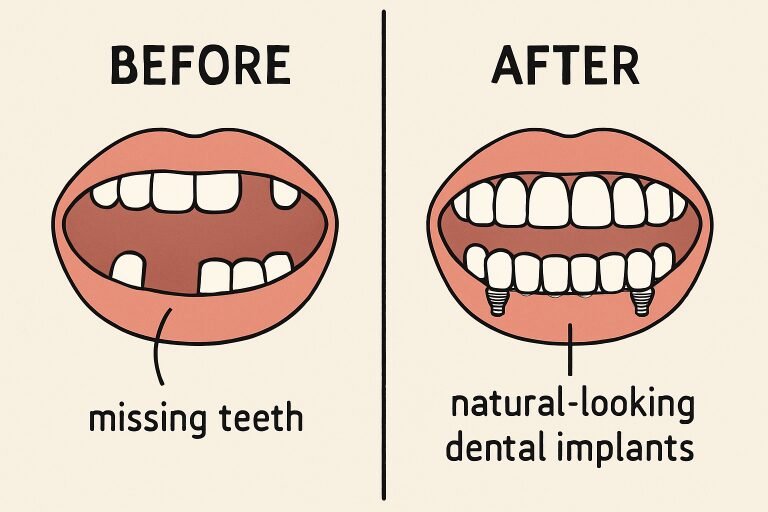Full-mouth dental implants provide a stable, long-lasting solution for individuals facing extensive tooth loss, restoring function and appearance. Unlike removable dentures, they are securely anchored to the jawbone, offering improved comfort, bite strength, and confidence. However, they are not ideal for everyone. Factors such as bone density, gum health, overall medical condition, and oral hygiene habits significantly determine candidacy. To ensure optimal results, the process involves a comprehensive evaluation, including imaging and treatment planning. While the investment is significant, the benefits—such as durability, natural aesthetics, and minimal maintenance—can be life-changing. Consulting an experienced dental professional helps determine suitability, explore alternatives, and develop a personalized plan prioritizing long-term oral health, comfort, and overall well-being.
Introduction
Restoring your smile and oral health can be life-changing, especially after extensive tooth loss. For individuals seeking a long-term and confident solution, complete dental implants offer a stable, durable alternative to conventional dentures. These advanced dental systems provide a natural-looking smile and preserve your facial structure and jawbone density, making them a popular restorative option for many adults.
Before deciding if this solution fits your needs, it’s essential to understand how complete mouth restoration with dental implants works, who makes an ideal candidate, and what the overall journey involves. A thorough understanding will empower you to have open conversations with your dental specialist and make an informed decision, prioritizing your long-term health and confidence.
Understanding Full-Mouth Dental Implants
Full mouth dental implants are an advanced restorative procedure that replaces all teeth in the upper and/or lower jaw using prosthetic teeth anchored by strategically placed implants. Unlike removable dentures, these implants are fixed into the jaw, providing exceptional stability and comfort. Implant-supported bridges or dentures are attached to the implants, resulting in a secure, functional, and aesthetically pleasing outcome. These treatments closely mimic the appearance and function of natural teeth, enabling patients to eat, speak, and smile with renewed confidence.
Benefits of Full-Mouth Dental Implants
- Preserves Jawbone Structure: Dental implants stimulate the jawbone, preventing bone loss and maintaining facial contours often lost with dentures or missing teeth.
- Exceptional Functionality: Implants restore natural chewing ability, allowing a broader diet and improved nutrition.
- Confidence in Appearance: Custom-designed to match your facial structure, implants look and feel like real teeth.
- Longevity: With proper care and maintenance, implants can provide decades of reliable service, often lasting a lifetime.
It’s important to note that the process and results may differ based on individual health factors and the expertise of the dental team. The benefits far outweigh the challenges for many, especially compared to less permanent alternatives.
Considerations Before Proceeding
Before choosing full-mouth dental implants, several critical factors should be evaluated:
- General Health Status: Chronic medical conditions such as diabetes or cardiovascular issues require careful management to ensure optimal healing and implant success.
- Jawbone Density: Adequate bone quality is necessary to anchor implants. If bone loss is significant, bone grafting may be recommended, which can extend the treatment timeline.
- Financial Commitment: Full mouth implant treatment represents a significant investment. While results can be transformative, understanding your insurance coverage and available financing options is essential.
Selecting a highly experienced dental implant specialist is crucial, as their technique and ongoing support significantly impact your experience and outcomes.
Potential Risks and Complications
No medical procedure is without potential drawbacks. While modern techniques make full mouth dental implants a safe solution, it’s essential to stay informed about possible risks:
- Infections: In rare cases, infections may occur at the implant site, emphasizing the need for stringent home care and professional follow-up.
- Implant Failure: The risk is higher for smokers and those with untreated medical issues or insufficient jawbone. Proper screening and transparency reduce these risks.
- Nerve Issues: Nerve injury during placement may rarely lead to numbness, tingling, or discomfort. Detailed pre-surgical planning minimizes the chances of such outcomes.
Review these concerns with your dental provider and ensure you have a personalized risk assessment as part of your treatment plan. For a deeper dive into dental implant procedures and research insights, consult this resource from Wikipedia.
Procedure Overview
Consultation and Planning
The process begins with a comprehensive assessment, including dental imaging and medical history review. This enables the dental team to create a detailed surgical plan specific to your anatomy and needs.
Surgical Placement
Titanium posts are inserted into the jawbone under anesthesia during the implant procedure. Depending on the protocol, immediate temporary teeth may be provided, giving you function and aesthetics while healing occurs.
Healing and Integration
In osseointegration, the implants gradually fuse with the jawbone, a process that typically takes several months. This phase is essential for creating a durable, long-lasting bond.
Prosthetic Attachment
Once healed, your custom-designed prosthetic teeth are affixed to the implants for a functional and natural look.
Maintenance and Care
- Brush and floss daily with specialized implant-safe tools and rinses.
- Attend all scheduled professional cleanings and dental evaluations to monitor health and address any early concerns.
- Avoid smoking, excessive alcohol, and chewing complex substances, as these can compromise the integrity of your implants.
Commitment to maintenance preserves both the beauty and function of your dental implants, enhancing your quality of life for years. For additional details on post-surgical care and what to expect, see this article from Wikipedia.
Conclusion
Opting for full-mouth dental implants is more than a cosmetic choice—it’s a long-term investment in your comfort, confidence, and overall well-being. These implants restore the appearance of a natural smile and improve chewing ability, speech clarity, and oral health. Success begins with thorough health preparation, setting realistic expectations, and committing to consistent aftercare to ensure lasting results. Partnering with a skilled dental implant specialist allows you to receive personalized guidance and a treatment plan tailored to your needs, lifestyle, and goals. If you’re ready to explore how this transformative option can enhance your quality of life, take the first step toward lasting dental restoration with complete dental implants and enjoy a renewed, functional, and beautiful smile.

